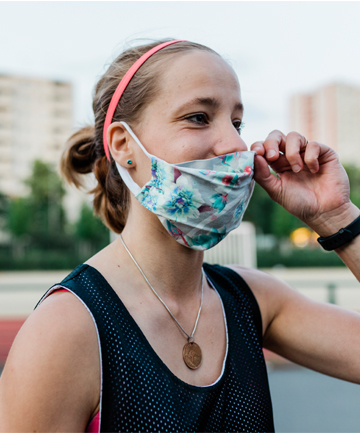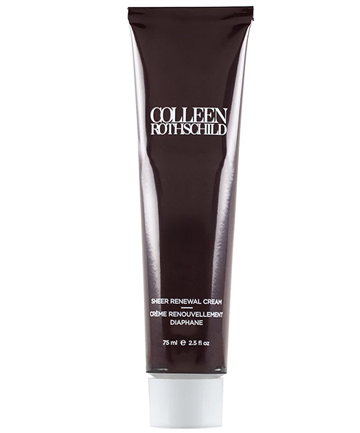Look: No one likes maskne. Unfortunately, face masks are something of a necessity these days. Usually, when skin is acting up, the best course of action starts with eliminating the cause of irritation... but in COVID-19 times that's not always realistic.
"Due to the current regulations in place, people are wearing masks and other protective face shields to help stunt the COVID-19 spread and, although it may seem trivial, some people are experiencing breakouts due to prolonged mask wearing," says dermatologist and founder of 5th Avenue Aesthetics, Dr. Marie Hayag. "These people are experiencing acne mechanica, a skin condition brought by prolonged wear of personal protective equipment. Not only are people experiencing clogged pores, acne and cysts, some people are reporting rashes and itching as well."
Dr. Hayag goes on to explain that since masks create heat, friction and occlusion to the skin (because a moist environment is created from talking and sweating), breakouts and rashes are inevitable for some. "People with rashes may also be experiencing rosacea, which typically flares with heat and friction."
Image via Willie B. Thomas/DigitalVision/Getty
"I recommend washing the face before and after wearing a mask using a gentle cleanser," says dermatologist Dr. Hadley King. "After, use a light moisturizer that's non-comedogenic, to support and bolster the skin barrier without clogging pores."
Dr. King goes on to single out humectants like glycerin as being a great way to hydrate the skin, particularly in the humid environment created by the mask. She also recommends looking for emollients like fatty acids and ceramides to support the skin barrier. "Colleen Rothschild Sheer Renewal Cream, $55, is a great option for a lightweight oil-free moisturizer. It contains glycerin to hydrate the skin, as well as fatty acids to support the skin barrier. It also contains antioxidants to help protect the skin from free radicals, and gentle chemical exfoliators to help prevent dead skin cells from clogging pores."
You can also consider adding an alcohol-free toner between your cleanser and moisturizer. "Select a toner with alpha hydroxy, salicylic or glycolic acid," says dermatologist Dr. Michele Green. "Using a toner is an additional step to cleanse the pores and remove any excess oil build up and bacteria after cleansing."
For severe acne breakouts resulting in cystic acne you should see a dermatologist to prevent acne scarring. "Tretinoin, which is a derived form of vitamin A, available only via prescription, is known for fighting acne and clogged pores. Tretinoin also works to reduce unwanted pigmentation and improves your overall skin texture," says Dr. Green.
Other ingredients that are effective for acne-prone skin include niacinamide, a powerful antioxidant derived from vitamin B3. This ingredient, according to Dr. Green, fights acne by reducing inflammation and dark spots. Other over-the-counter options Dr. Green likes include salicylic acid, benzoyl peroxide, and zinc pyrithione. "Some of my favorite products are Mario Badescu Acne Facial Cleanser, $15, La Roche-Posay Effaclar Astringent Toner For Oily Skin, $23.99, and MG Skin Labs Retexturizing Pads, $65."
You'll want to make it a point to avoid heavy makeup. "I would also stay away from heavy creams, ointments, topical steroids and avoid scrubbing, which generally causes more irritation," says dermatologist Dr. Collyer, the medical director at Modern Dermatology.
If you're still not seeing an improvement, try switching up your mask. "Cotton is a breathable fabric and will therefore be less irritating," says Dr. King. "Insert a coffee filter between layers of fabric for extra protection. Using doubled up 600-thread count pillowcases or flannel pajamas can make a mask that provides up to 60 percent filtration." For a ready-to-buy option Dr. Green likes Hanes' masks. "These masks are made from breathable, tightly woven cotton that wicks moisture from your face to the outer layer of the mask. They are also economically priced."
You'll also want to try to be cognizant of the times of day you're outside. "I recommend avoiding going outside during the hotter times of the day and using one mask per day; every time you use a mask it absorbs bacteria from your mouth, sweat and oil like a sponge so it's important to wash your mask between uses," says Dr. Hayag.Mask itchiness can have a few different causes. "Itching may be a sign that a person is allergic to the mask that they are wearing, which is why I typically recommend avoiding commercial face masks which tend to be treated with formaldehyde," says Dr. Hayag. "Additionally, people may be experiencing a reaction to the products used to clean their masks, so it's best to launder reusable masks with unscented laundry products, as heavily scented products can cause irritation and itching."
She adds that dry skin may also cause itching, so be sure to moisturize prior to putting on a face covering. Oatmeal skin care products can be particularly helpful here. "Oats have been known to reduce inflammation of the skin, while also stimulating the production of collagen," says Dr. Green. "The oats bind to the skin creating a shield against irritation while locking in natural moisture from your skin." (To this end, we've always been fans of the First Aid Beauty Ultra Repair Cream Intense Hydration, $34.)









